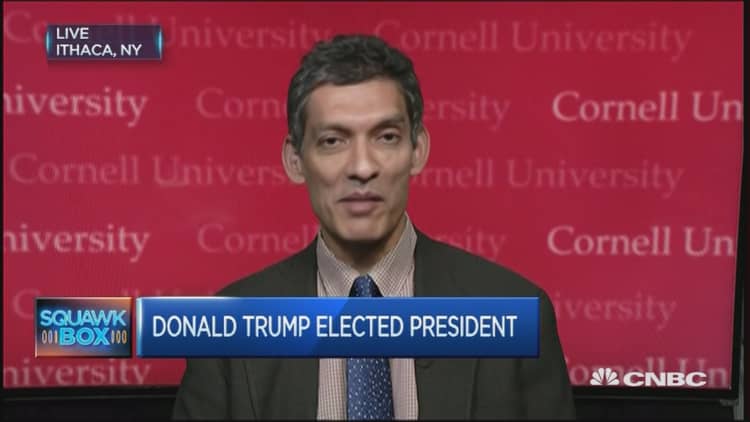Getting tough on China to placate some of the frustrations of the U.S. electorate would be tempting for president-elect Donald Trump but the long-term implications of such a policy stance would be detrimental to U.S. interests, an academic told CNBC on Thursday.
Eswar Prasad, a professor of trade policy at Cornell University, told CNBC's "Squawk Box" that such a move would not address the deeper, fundamental problems that have hurt lower-middle class American voters. Instead, it would only spark retaliatory measures from Beijing that could harm U.S.' global interests.
"Almost certainly we would see an aggressive and strident reaction from China (if Trump were to carry out on his election promises)," said Prasad. "Possibly reducing access to Chinese markets for U.S. businesses and putting a crimp on U.S. companies operating in China."
On the campaign trail, Trump vowed to label China as a currency manipulator and impose a 45 percent tariff on Chinese imports.
Retaliation from Beijing could cost US
HSBC analysts added there were several ways in Beijing could respond to punitive measures from the U.S.
China could impose tariffs on some or all of its imports from the U.S., extending them to even the services sector, where the U.S. saw a $28 billion trade surplus in 2015 due to education and tourism, according to HSBC, citing U.S. customs data.
"China could discourage the purchasing of U.S. goods, services and even reject its popular culture (e.g. movies)," the HSBC analysts said. "That would extend the economic pain beyond U.S. exports to U.S. manufacturers and service providers producing and operating elsewhere, too."
While a trade conflict could see a reduction of China's trade surplus with the U.S., it could worsen the foreign exchange demand-supply imbalance in the Chinese domestic market.
HSBC analysts said a trade spat could reduce China's incentive to defend the currency and let the renminbi weaken substantially. This could potentially lead to a currency war, pushing other Asian and commodity-related currencies lower versus the dollar.
Another area that would possibly take a hit is investments. "Speculation could rise as to whether China could sell some of its $1.2 trillion holding of U.S. government bonds and roughly $600 billion worth of other U.S. financial instruments," HSBC said, which could trigger global volatility in financial markets.
Insufficient evidence to label China 'currency manipulator'
Even then, China's current trade relation with the U.S. might not meet all of the latter's criteria to call out a country for unfair trade practices.
JPMorgan analysts pointed out in a note that according to the U.S. Treasury's rules and regulations, three criteria needed to be met before the U.S. could impose "meaningful penalties" on countries that failed to adopt appropriate trade policies: a significant bilateral trade surplus with the U.S.; a material current account surplus larger than 3 percent of gross domestic product; and persistent interventions to keep its currency weak.
According to the Treasury's latest assessment report in October, China only met the first criteria.
"Fundamental factors do not support labeling China as a currency manipulator," the JPMorgan analysts said.
China could win in the long run
Prasad pointed out that a confrontational stance would hurt both countries in the short term, but the U.S. stood to lose more in the long term if it were to disengage substantially from Asia, as Trump's campaign rhetoric has suggested.
"The U.S. is now going to be seen as a less predictable partner in trade (and) financial agreements, which would draw other (Asian) countries close to the embrace of China," he said.

Both countries have been wrestling to exert their influence in the broader Asia Pacific region in the past.
While the current U.S. administration had hoped to cement that influence further with the passing of the Trans Pacific Partnership trade deal, Trump has previously said he would veto against it.
Meanwhile China has expanded its One Belt, One Road initiative, reached out to Southeast Asia with the Regional Comprehensive Economic Partnership (RCEP) and set up the Asian Infrastructure Investment Bank to draw more countries into its sphere of influence.
On Wednesday, Chinese state-owned media were quick to chip in on the U.S. elections.
Xinhua News Agency ran a commentary saying current problems in the U.S. were due to "polarized parties," "divisive politics" and "racial tension." It said the U.S. should look inwards to fix its problems instead of using the international society as "scapegoat."
China Daily, another state-owned outlet, pointed out President-elect Trump "may think differently than Trump the presidential candidate" but warned Beijing must brace itself for what lay ahead.
"In the short run, nobody wins, but in the long run, China could be well-positioned to win," Prasad concluded.


